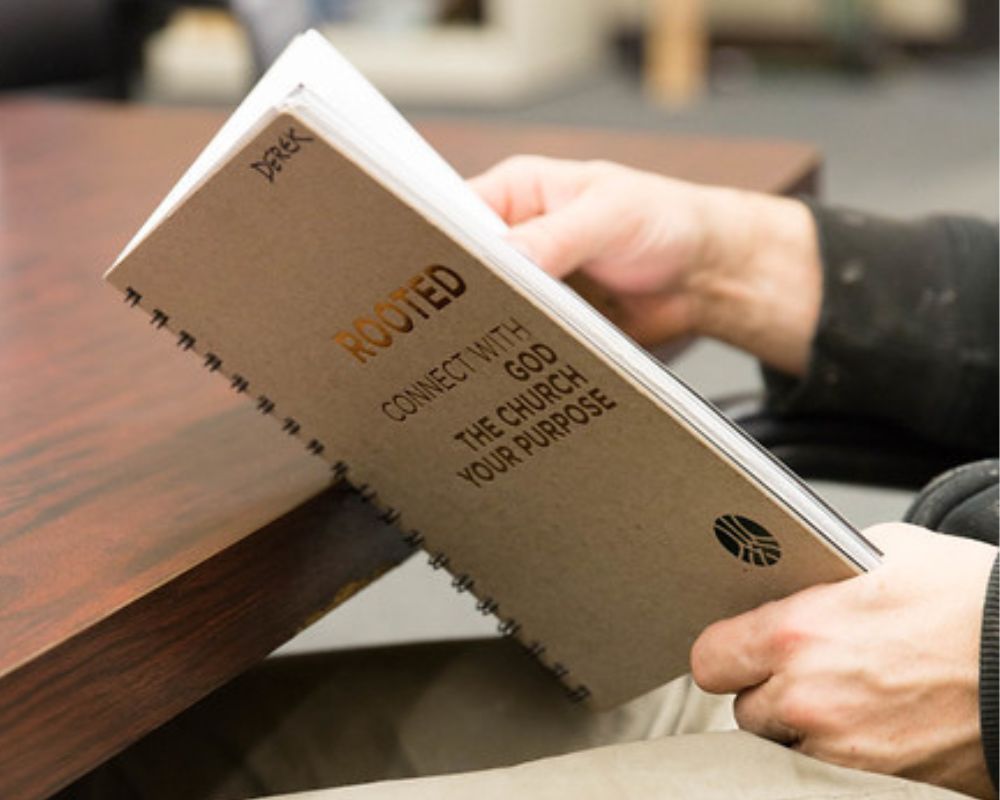Are You Rooted?

What Do We Need Roots For? “To be rooted is perhaps the most important and least-recognized need of the human soul” -Simone Weil, French Philosopher Roots are one of the most important parts of the plant. Stretching into the soil, roots provide stability for the plant, allowing it to sustain high winds or trampling. They gather nutrients and water from the soil, feeding the plant and sustaining its life. They even store some of these nutrients to provide the plant with food in seasons of hardship. Healthy root systems can even ward off disease and keep a plant focused only on absorbing nutrients that are good for it. A few summers ago, my family took a trip to California and stood in awe in a forest of Redwoods. Redwoods are among the largest and tallest trees in the world. While their roots stay shallow in the soil, they spread 50–100 feet out from the tree. The roots intertwine themselves with the roots of all the other Redwood trees. This community of roots provide additional stability for the tree in storms and flooding. What Do Roots Need To Survive? If you’ve ever gardened, taken a walk after a storm, watched the landscape change in times of drought, or seen crops decimated by bugs, you’ll realize that simply having roots is not all a plant needs to thrive. The roots have to stretch deep into the ground, and they have to be planted in the right kind of soil. They have to be watered and fertilized, and may even need to be surrounded by other plants that provide benefits to their well-being. Growing up, my parents always kept a large garden in our backyard. As a child, I helped till the soil, plant the seeds, water, and harvest the vegetables. I used to love the fresh green beans and cucumbers, while my mom would eat tomatoes by the pound. The garden thrived, and it was something I believed I could replicate at my own home. Recently, my husband and I celebrated our 13th wedding anniversary, which also marks the 13th year we’ve been in our home. The first year we moved in, I planted a large garden in the back corner of our property. I watered it daily, my plants grew and flowered, and I became so excited about the fresh produce we would enjoy. As the vegetables began to grow, though, my plants began to shrivel. Some were eaten by beetles, deer, and rabbits. Some just dried up and sank back into the earth. I was so disappointed that all my hard work had amounted to nothing. I decided to stop planting things and, in fact, ripped out a bunch of plants around the house. Don’t Give Up – Dig In We put rocks in our landscaping, and I swore I wouldn’t plant again, as it was obviously something I wasn’t very good at. Sometimes, this is how our faith life can go. We try it for a season without laying any significant roots or really investigating how we can strengthen our faith. We come up fruitless. In our frustration, we don’t return to our faith or our relationship with God in a serious way. Because of fear that it won’t yield results, we may even become cynical or angry at God. Scripture often provides metaphors between plants and our relationship with God. Within Scripture, we are compared to seeds that need planting in the right kind of soil, branches that need to stay connected to the Vine, and trees planted by streams of water if we remain focused on His ways. Colossians 2:7 states, “Let your roots grow down into him, and let your lives be built on him. Then your faith will grow strong in the truth you were taught, and you will overflow with thankfulness (NLT).” Spiritual “Roots” Need Nourishment Too If you were to examine your life right now, where have you laid roots? Are you planted in soil that provides you nourishment and hope, or are your roots thirsting after something that leaves you dry and wanting more? When the wind blows and storms set in, are your roots planted firmly in the ground, or do you feel tossed about and unsettled? Have you surrounded yourself with other plants that enrich the soil, intertwining their roots with yours to help you stand strong and shield you, or are you attempting to stand alone and wish for the best? Beginning September 11 at all campuses of The Village Christian Church, you will have the opportunity to spread your roots into good soil. To grow in a way that will be fruitful and long-lasting. To be planted in something stable and full of truth. The Village will be offering a program called Rooted for ten weeks beginning in September. And we will celebrate your growth on November 14. Find What You Are Missing During Rooted Our mission statement here at The Village is Life Change, Life Growth, and Life Purpose. Is your life is in a place where drastic change is needed, where you need to meet God face to face and invite Him into your heart? Rooted is the place for you. Do you know God, but need to grow in your relationship with Him and His believers? Rooted is the place for you. If you’ve been walking with God awhile, but you lack purpose and vision and don’t realize all the plans that God has for you, then Rooted is also the place for you. For ten weeks, Rooted will walk all participants through the seven habits or disciplines of a relationship with God. Here at the Village, we have four core values: everybody grows, everybody serves, the Bible is our guide, and no boring here. The seven disciplines of Rooted will allow you to see these core values at play. Everybody will grow while learning how to pray and overcome strongholds in their lives, eventually learning to share their faith journey
What Is Real Life-Change Worth?

What is REAL life-change worth? It is a powerful question. Is there a set time limit or dollar amount you are comfortable investing to experience it? Will it require change? Change can be difficult, but sometimes necessary. The Gift of Time In general, we all have a daily schedule that we stick to and are comfortable with. I myself, am regimented about my schedule each day. So today, I sit and ponder the ways I use the gift of time I receive daily. It is filled with a variety of necessary and unnecessary items; I sleep, shower, grocery shop, eat, pay bills, work inside and/or outside the home, spend time with family, put gas in my vehicle etc. What about how we spend “free time”? I can easily use every minute of it engaged in activities that fill a ton of space time-wise, but don’t “fill” my heart. It is easy for me to fill it with my favorite TV shows and social media. How about you? What does your free time look like? Now ask yourself, “where does my relationship with the Creator and Sustainer of the universe fit in with all the demands and choices I make? He has a far better plan for your life then you do. Are you really leaning into that?” There are many things that you must do and choose to do that don’t produce REAL life-change. They may change your circumstances but not your heart. What Do You Want? Do you want a feeling of being full? How would it feel if you didn’t have to look further for peace, happiness, or reasons to be thankful? How about not having to search for freedom from uncertainty, confusion, and insecurity, or for your purpose? Would you like to feel ready for tomorrow with all the energy and support you need? Come to Rooted. Everyone wants to be a part of something big and this is your chance. Have a purpose, know what your purpose is, and champion an effort that will make a difference. Do you want to change the world? Do you want your world to change? Come to Rooted. Do you want to find community? Come to Rooted. Do you want to know why the Village should be your home? Come to Rooted. Maybe you’ve been walking with the Lord for a long time. Why would you want to come to Rooted? Rest assured that it is for everyone, even you. It will extend your roots, fills in any gaps in understanding and expand your vision past your current line of sight. Come to Rooted. Experience life-change together. Learn more about Rooted
Is The Bible Reliable?

Bible Stories Even if you weren’t raised in the church, you still know more bible stories than you think: Noah and the ______. Jonah and the ______. Joseph and the Amazing ________. Moses and the _______________. Jesus was born in a _____________. He raised from dead on the _____ day. In our culture, many people were raised with these stories and took them as truth. You either grew to understand the context of the stories, or you grew to doubt. Science, logic and history may have contradicted the Sunday School version of the Bible that you knew. In fact, you may have come to doubt if you can trust the words in the Bible. How Did The Bible Become The Bible? Before we can determine if the Bible is reliable, we have to ask, how did the Bible become the Bible? I mean, who wrote it? And why? God didn’t write it. Jesus didn’t write it. So, where did it come from? Historical documents and secular scholars agree that Jesus existed and was executed on a cross, but the story of “The Bible” does not begin in Genesis and it doesn’t starts with His birth. The story of the BIBLE starts when the women show up at an empty tomb. When hundreds of people see Jesus ALIVE in Jerusalem after he was killed publicly on a cross and buried. The resurrection was THE NEWS STORY of the first century. The Bible actually begins BECAUSE of a doctor named Luke. He was not Jewish, but Greek. He was asked to write a document for Theophilus, a wealthy man that had heard many stories of Jesus, from many different disciples. Luke had heard enough stories and met enough of the eye witnesses that he had put his faith in Jesus. So, He asked Luke to give him “the full story”. This is how his document begins: Many have undertaken to draw up an account of the things that have been fulfilled (or have happened) among us, Just as they were handed down to us by those who from the first were eyewitnesses and servants of the word. – Luke 1:1 It’s unusual that more than one account occurred of same event. In ancient times there are virtually no multiple accounts of the same event. The life of Jesus actually stands out in history simply for the fact of multiple written accounts of his life. Therefore, since I myself have carefully investigated everything from the beginning, it seemed good also to me to write an orderly account for you, most excellent Theophilus, so that you may know the certainty of the things you have been taught. – Luke 1:3 Luke tells us about Mary. Have you ever wondered how we know what the angel said to Mary? It’s because Luke interviewed her. He tells us about all kinds of details, that’s how doctors are. He tells us the name of the person that paid for Jesus’ burial, and many more details that seem insignificant, but are important to the actual proof of life. Why So Many Accounts? It was expensive and unusual to write back then. Most people were illiterate. There are so many accounts because SOMETHING HAPPENED. We know that 4 of the disciples accounts ended up in this. Mark was short, to the point, and full of action. Matthew, a Jew, was saying trust me – Jesus is the Messiah we have been looking for. Luke admits that he is not the only one. John was old, why write it? Jesus performed many other signs in the presence of his disciples, which are not recorded in this book. – John 20:30 But these are written, that you may believe. -John 20:31 That Jesus is the Messiah, the Son of God, and that by believing in him you will have life bu the power in his name. -John 20:31 John’s account is all you need. If this is all you ever read, you ever know, this is enough. In addition to all of the accounts of Jesus’ life from his closest disciples, there are also a lot of writings that end up in the Bible. In addition to his account of Jesus’ life, Luke also wrote an account of the first 30 years in the life of the Church, which we call the book of Acts. Luke knew Peter, John and Matthew, he also knew James, brother of Jesus, and he really knew Paul. He traveled and planted churches with Paul. Secular historians agree that the writings of Paul shaped the culture of western civilization. Paul was more than just a Jesus follower and church planter. He explains how Christians should use the Old Testament, for inspiration and motivation, not application. Paul is important to THE BIBLE because: 1. He wrote some of it. 2. He explains the relationship between the parts. 3. He authenticates the resurrection. Some secular scholars dispute the Gospels, their timeline and authorship. They say that Christians made up the story of the resurrection after everyone that could deny it was dead, and then wrote these Gospels to give credence to their made up religion. There are so many historical reasons this doesn’t make sense. Paul’s letter to Corinth is INDISPUTABLE evidence that Jesus’ resurrection was accepted as fact IMMEDIATELY. Nobody disputes that Paul wrote the document we call 1 Corinthians. Nobody disputes that he wrote it about 55 AD, 3 years after he planted the church in Corinth. The Timeline Now, brothers, I want to remind you of the gospel I preached to you, which you received and on which you have taken your stand. – 1 Corinthians 15:1 For what I received I passed on to you as of first importance: that Christ died for our sins according to the Scriptures, that he was buried, that he was raised on the third day according to the Scriptures, – 1 Corinthians 15:3 and that he appeared to
